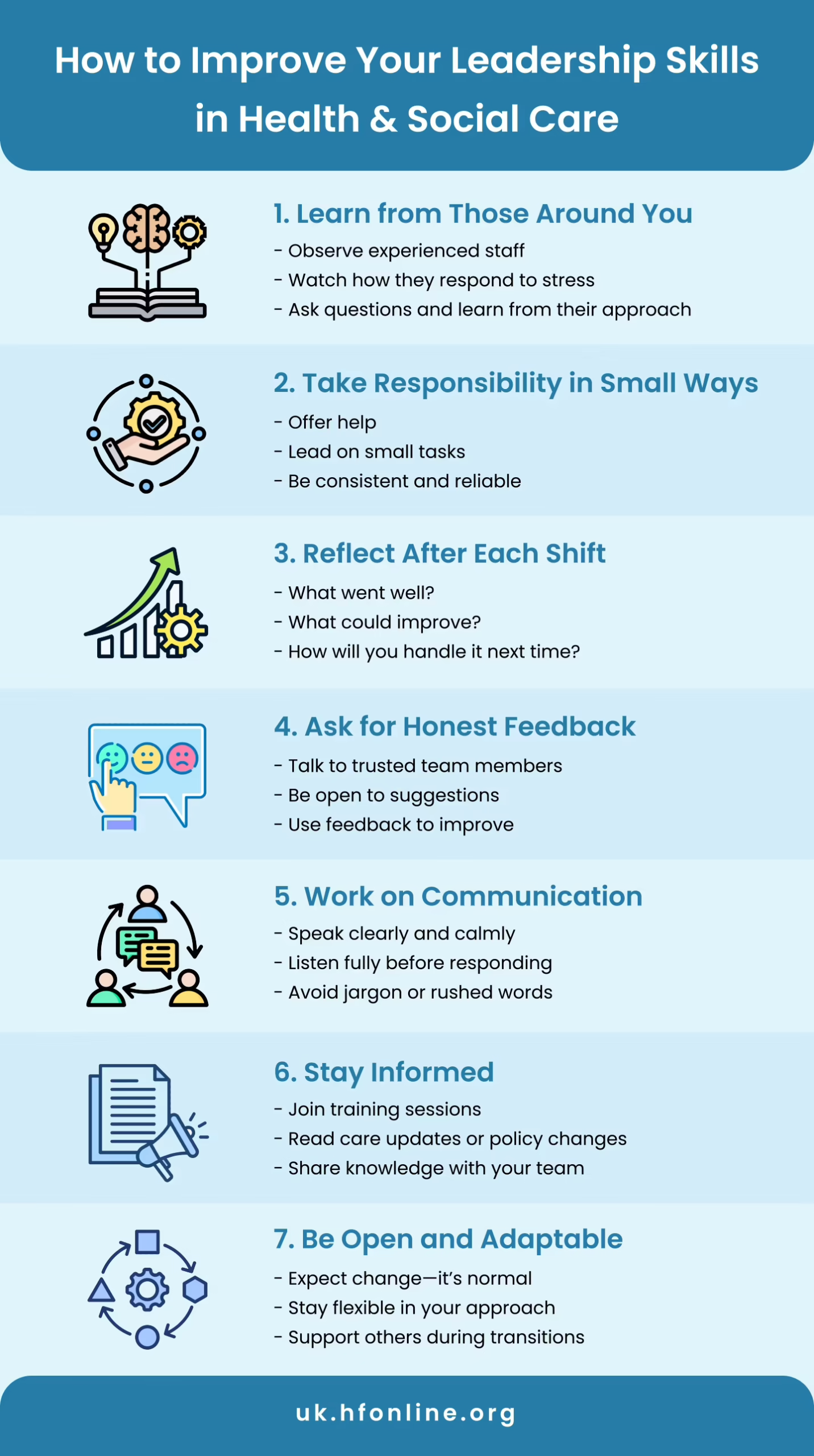
“I didn’t see myself as a leader until my team looked to me during a crisis.” This is a common feeling among health and social care professionals. In a sector where decisions affect lives, leadership is more than authority—it’s about guidance, trust, and calm under pressure. Whether you’re managing a care team or supporting vulnerable individuals, strong leadership ensures better outcomes for both staff and service users.
Developing leadership skills in health and social care is essential for improving team performance, ensuring quality service delivery, and fostering a culture of respect and resilience. It empowers individuals to respond to complex challenges with confidence and clarity.
In fact, a 2023 report by Skills for Care found that over 80% of adult social care employers in England believe effective leadership is vital for high-quality care and workforce retention source. With ongoing pressures in the sector, building leadership capability has never been more urgent.
In this blog, you’ll learn what leadership really looks like in health and social care, which skills matter most, and how you can build them steadily and confidently in your day-to-day role.
What is Leadership in Health and Social Care?
Leadership in health and social care is about guiding others to give safe, kind, and effective support. It’s not only about telling people what to do. It’s about setting an example, staying calm, and helping your team work well together.
Good leaders notice problems early. They speak up and act when something isn’t right. They listen, support others, and help make decisions that protect those in care.
You don’t need a fancy title to be a leader. Whether you’re new or experienced, how you act each day can make a big difference.
In care settings, leadership helps everyone stay focused, feel supported, and work with purpose. It builds trust—both with the team and with the people we care for.
Why Are Leadership Skills Important in Health and Social Care?

When people feel supported, respected, and clear about their roles, the quality of care improves—and leadership is often the reason behind that. Strong leadership helps teams handle challenges, deliver consistent care, and create a better working environment for everyone involved. Here’s how it makes a real difference:
1. Support Better Decision-Making
Care settings often involve quick decisions under pressure. Strong leaders stay calm, assess the situation, and act with clarity. This helps prevent errors and ensures the right care is given at the right time.
2. Boost Team Confidence
When you lead well, your team feels supported. People know what’s expected and feel more secure in their roles. This confidence helps the whole team perform better.
3. Create a Positive Workplace Culture
Leadership shapes how teams work together. A good leader listens, treats everyone fairly, and builds trust. This reduces stress and creates a more respectful, productive environment.
4. Improve the Quality of Care
Leaders help teams stay focused on what matters most: the people receiving care. With strong leadership, services become more consistent, personal, and responsive to individual needs.
5. Manage Change and Solve Problems
In care, things often change quickly. Good leaders guide others through uncertainty. They spot issues early, take action, and help the team adapt.
6. Lead by Example
You don’t need a job title to be a leader. Everyday actions—like staying calm, helping others, or taking responsibility—can inspire your team. Leadership starts with how you carry yourself.
Health and Social Care Level 3 Diploma
What Are the Essential Characteristics for Successful Leadership in Health and Social Care?
To lead well in care settings, you don’t need to be perfect. But there are key traits that help you lead with impact and trust. Here’s what really matters:
1. Good Communication
You need to speak clearly and listen well. People should understand what you mean and feel safe to speak up. This builds trust and avoids confusion.
2. Empathy and Compassion
You work with people who may be in pain, scared, or confused. Being kind and understanding helps you connect and support them better. It also brings your team closer.
3. Confidence Without Ego
A good leader is sure of their actions—but not arrogant. You should be able to make decisions and stay calm, even when things go wrong. Confidence gives others reassurance.
4. Honesty and Accountability
Mistakes can happen in care. Strong leaders admit them, take responsibility, and learn. This sets the right tone for the team.
5. Problem-Solving Skills
Challenges come up daily. You need to think clearly, stay calm, and find simple ways forward. It’s not about having all the answers—it’s about taking action when needed.
6. Flexibility
No two days are the same in care. A strong leader can adapt quickly. You may need to shift plans or change your approach depending on the situation.
7. Patience
Things don’t always go smoothly. People need time to learn, change, or feel better. A patient leader gives space and support without pressure.
How Can You Improve Your Leadership Skills in Health and Social Care?

Improving your leadership skills doesn’t mean you need to change who you are. It’s about building habits that help you guide others with confidence. Here’s how you can start:
1. Learn from Those Around You
Look closely at how experienced staff lead others. Notice how they talk during stressful moments, how they solve problems, and how they support their team. You can pick up a lot just by paying attention. If you’re unsure about something, don’t be afraid to ask—most people are happy to share what they know.
2. Take Responsibility in Small Ways
Leadership isn’t just about having a title. You show leadership when you offer to help a colleague, lead on a small task, or take the initiative when something needs doing. These actions build trust and respect. Over time, people will see you as someone they can rely on.
3. Reflect on Your Practice
After each shift, take a moment to think. What went well? What didn’t? What would you handle differently next time? Regular reflection helps you spot patterns in your actions and gives you a chance to improve without being too hard on yourself.
4. Ask for Honest Feedback
You can’t see everything from your own point of view. Ask trusted colleagues or supervisors what they think you’re doing well—and where you could do better. This feedback can be helpful, even if it’s not always easy to hear. Use it to shape how you lead in the future.
5. Work on Your Communication
Clear, calm communication builds stronger teams. Practice saying what you mean without rushing or using complicated words. Listen without interrupting. When people feel heard and understood, they trust you more—and that’s the base of strong leadership.
6. Stay Informed and Keep Learning
Leadership also means staying updated. Take part in training when it’s offered. Read up on best practice or changes in care policies. Being informed helps you lead with confidence and show your team that you’re committed to doing things the right way.
7. Be Open and Adaptable
Change is a big part of care work. Whether it’s new procedures or new people joining the team, things rarely stay the same for long. Good leaders adjust quickly and help others stay calm through change. Being flexible also shows you can handle whatever comes next.
What Are Some Good Leadership Examples in Health and Social Care?

Being a leader in a care setting isn’t about giving orders—it’s about how you carry yourself, how you communicate, and how you support others every day. Here are some real and practical examples of what strong leadership looks like in action:
Leading by Example
You set the tone by how you behave. If you stay calm in a crisis, others are more likely to do the same. If you show respect, your team will follow that lead. People notice your actions more than your words.
Clear Communication
Saying what you mean, and listening closely, helps avoid mistakes. You speak in a way that’s easy to understand. You also check in with people to make sure they’ve got the message. This keeps things running smoothly.
Empowering Others
Good leaders don’t try to do everything themselves. They encourage others to take the lead when they’re ready. You might guide a new team member through a task instead of doing it for them. That builds confidence and skills.
Building Relationships
Strong teams are built on trust. You take time to get to know people and understand their needs. When relationships are strong, communication improves and problems are easier to solve. People are also more willing to support each other.
Adaptability and Resilience
Plans can change fast in care settings. A good leader stays steady when things go wrong. You adjust without panic and help others do the same. This makes your team feel safe, even during tough shifts.
Advocacy and Social Responsibility
Leaders speak up for what’s right. You might raise concerns if someone isn’t being treated fairly. You help make sure every person—staff or service user—is treated with respect and dignity. This is a big part of care work.
Continuous Learning and Development
Leadership doesn’t stop at one level. You look for ways to improve your skills and learn from others. You stay open to feedback and take part in training when possible. This shows your team that learning is part of the job.
Conclusion
Leadership in health and social care starts with everyday choices—how you treat others, how you handle pressure, and how you guide your team. It’s not about being perfect. It’s about showing up with clarity, care, and confidence.
If you’re ready to build those skills in a real, practical way, taking a structured step forward can help. The Health and Social Care Level 3 Diploma is designed to support your growth—not just in knowledge, but in leadership that makes a difference where it counts most.
Frequently Asked Questions
Leadership skills in health and social care involve guiding and supporting others to deliver safe, respectful, and effective care. These include communication, decision-making, empathy, and the ability to stay calm under pressure. Strong leaders also help teams work better together and respond to change with confidence.
Leadership keeps care teams focused, organised, and supported. It helps staff feel confident in their roles, which improves the quality of care for service users. Good leadership also ensures problems are spotted early and dealt with in a safe and respectful way.
Yes. You don’t need to be a manager or have a job title to lead. Leadership is about how you act—showing respect, supporting others, and taking responsibility. Anyone, at any level, can develop leadership skills and make a positive impact.
Some key qualities include clear communication, patience, empathy, honesty, and the ability to stay calm in tough situations. Being open to feedback, solving problems quickly, and building trust with your team are also important traits.
Start by taking small steps—support a colleague, take initiative, and ask for feedback. Learn from experienced staff, reflect on your work, and look for chances to lead during your daily tasks. Training courses can also help build your confidence and skills.
Management focuses on tasks, schedules, and systems—making sure things get done. Leadership is about people. It’s about guiding, inspiring, and supporting others to work together and deliver the best care possible. Both are important, but leadership is what holds teams together.
Keep things simple and clear. Listen actively, ask questions, and make sure everyone feels heard. Use regular check-ins to keep the team informed and involved. A calm, open approach helps build trust and avoids misunderstandings.
Yes. A great option is the Health and Social Care Level 3 Diploma, which covers leadership development alongside core care skills. It’s flexible and designed for people already working or looking to progress in care.
Examples include staying calm in emergencies, helping new staff settle in, speaking up when something’s not right, or guiding a team through change. Even small actions—like offering support or solving a problem—can show strong leadership.
Good leaders keep teams focused, reduce mistakes, and help create a respectful, calm environment. This directly improves the care service users receive—making it safer, more personal, and more consistent.